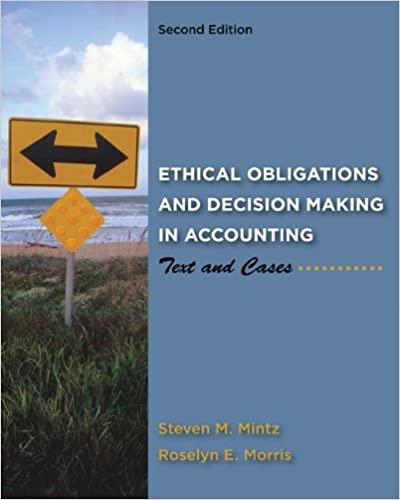Im sorry, Lucy. Thats the way it is, Ricardo Rikey said. I just dont know if I
Question:
“I’m sorry, Lucy. That’s the way it is,’ Ricardo Rikey said.
“I just don’t know if I can go along with it, Rikey,” Lucy replied.
“We have no choice. Juggyfroot is our biggest client, Lucy. They’ve warned us that they will put the engagement up for bid if we refuse to go along with the reclassification of marketable securities,” Rikey explained.
“Have you spoken to Fred and Ethel about this?” Lucy asked.
“Are you kidding? They’re the ones who made the decision to go along with Juggyfroot,” Rikey responded.
The previous scene took place in the office of Deziloo LLP, a large CPA firm in Beverly Hills, California. Lucy Spheroid is the partner on the engagement of Juggyfroot, a publicly owned global manufacturer of pots and pans and other household items. Ricardo Rikey is the managing partner of the office. Fred and Ethel are the two members of the firm that make final judgments on difficult accounting issues especially when there is a difference of opinion with the client. All four are CPAs.
Ricardo Rikey is preparing for a meeting with Norman Baitz, the CEO of Juggyfroot. Rikey knows that the company expects to borrow \($5\) million next quarter and it wants to put the best face possible on its financial statements to impress the banks. That would explain why the company had reclassified a \($2\) million market loss on a trading investment to the available-for-sale category so that the “loss” would now show up in stockholder’s equity and not as a charge against current income. The result was to increase earnings in 2010 by 8 percent. Rikey also knows that without the change, the earnings would have declined by 2 percent and the company’s stock price would have taken a hit.
In the meeting, Rikey points out to Baitz that the investment in question was marketable and in the past the company had sold similar investments in less than one year. Rikey adds there is no justification under generally accepted accounting principles to change the classification from trading to available-for-sale.
Questions 1. Explain the rules in accounting to determine whether an investment in a marketable security should be accounted for as trading, available-for-sale, or held-to-maturity.
Include in your discussion how such classification affects the financial statements.
2. Who are the stakeholders in this case? What expectations should they have and what are the ethical obligations of Deziloo and its CPAs to the stakeholders? Use ethical reasoning to answer this question.
3. Using the AICPA Code of Professional Conduct as a reference, what ethical issues exist for Rikey, Lucy, Fred and Ethel, and Deziloo LLP in this matter? What role does auditor virtue play in determining what to do in this case?
Step by Step Answer:

Ethical Obligations And Decision Making In Accounting Text And Cases
ISBN: 9780078025280
2nd Edition
Authors: Steven Mintz, Roselyn Morris





